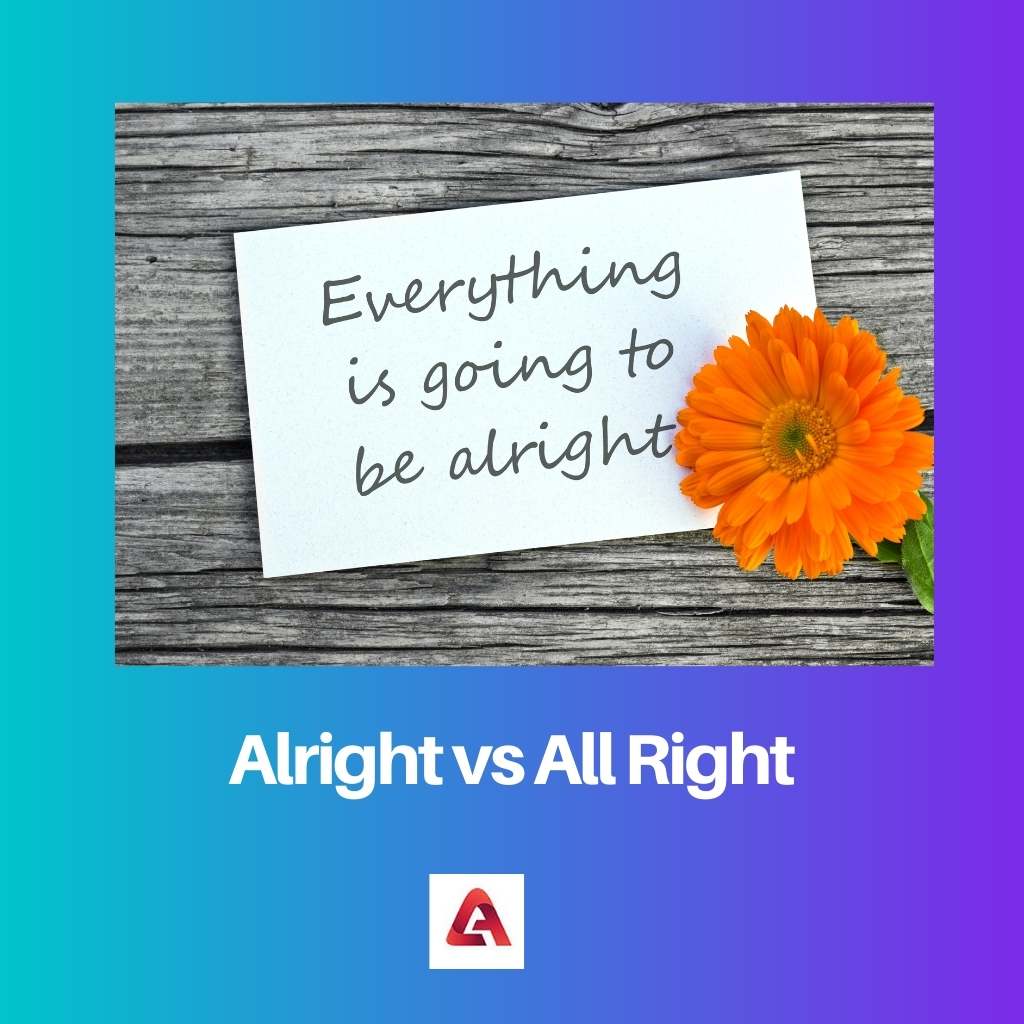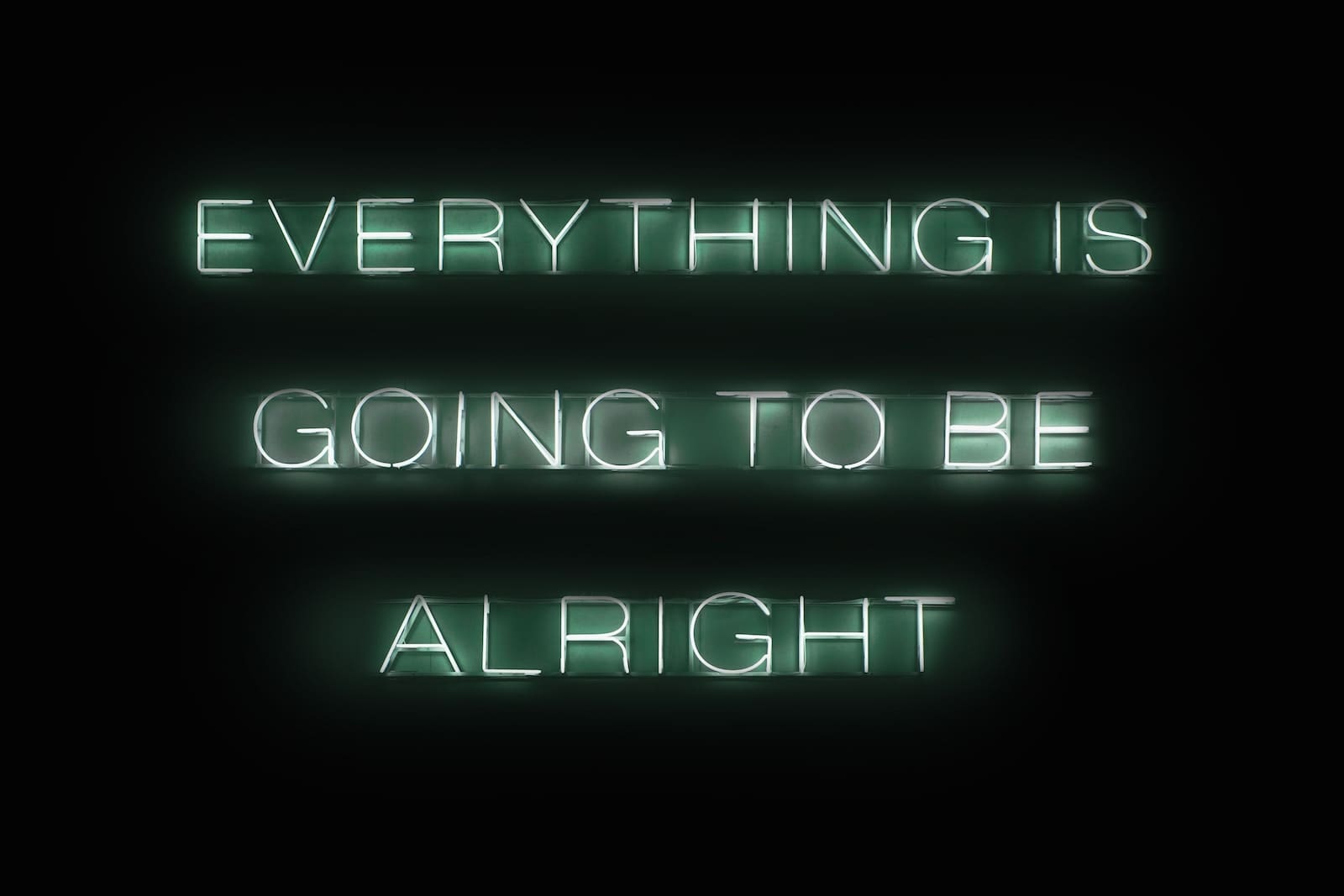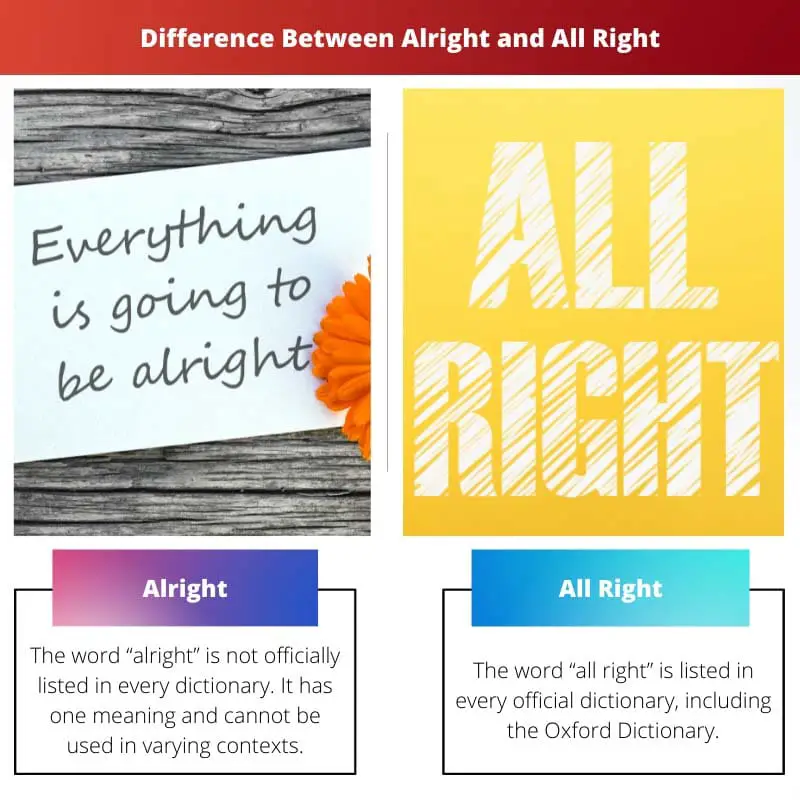People are frequently startled to hear that alright is not a commonly used spelling for all right. Even though the one-word spelling of alright is common in informal language, teachers and publishers will always regard it as improper.
To use the phrase with relative ease, spell it out as two words: all right.
Key Takeaways
- “Alright” is a nonstandard spelling of “all right.”
- “All right” is the correct spelling of the phrase that means “satisfactory” or “okay.”
- “Alright” may be considered informal or conversational in some contexts.
Alright vs All Right
‘Alright’ and ‘all right’ both convey the same meaning of ‘acceptable’ or ‘in order’, but ‘alright’ is a more casual and modern spelling that’s not universally accepted in formal writing. ‘All right’, the original and traditional spelling, is considered correct in all contexts.

The word “alright” is not officially listed in every dictionary. It has one meaning and cannot be used in varying contexts.
It is used to refer to something that is “OK” or “satisfactory”. Its usage is only informal.
It was first used in the decade of the 1860s.
The word “all right” is listed in every official dictionary, including the Oxford Dictionary, which defines it as a synonym of “OK” and is also used to refer to something that is all correct. It first came into use in the 15th century.
It is a word that can be used informal conversations.
Comparison Table
| Parameters of Comparison | Alright | All Right |
|---|---|---|
| Listing in Dictionary | Not listed in all dictionaries | Listed in all dictionaries |
| Mode of Usage | Informal | Formal |
| Number of Meanings | One meaning only | Two meanings, varying in context |
| Meaning | It means “OK” / “satisfactory” | It can have two meanings- “OK” and “all correct” |
| Year of Origination | The 1860s | 15th century |
What is Alright?
The form alright is a one-word spelling of the phrase all right, which appeared for the first time in the 1860s. Although Alright is frequently used in written discussion and casual writing, it is the sole appropriate form in edited writing.
In general, it is not acceptable to use alright in Standard English. Its casual usage is rather common.
The popular song “The Kids Are Alright” exemplifies mainstream acceptance of the informal alright.
On the other hand, the writers of the 2010 film The Kids Are All Right could not bring themselves to adopt the informal variation.
It is a handy little rendition that appears perfectly at home among a slew of other popular words—already, although, all together and always.
For a long period of time, English spelling was flexible, and the words were all right, already, and others had numerous forms throughout hundreds of years until the 18th century when it stabilized into the spellings that we remember today.
After that settlement, only all right gained a current variant spelling. Alright, it dates back to Mark Twain around 1865 in literature. As a result, it is a bit of a newcomer.
It is likely that Alright will find acceptance someday. Both already and altogether are instances of words that began as two independent terms.

What is All Right?
All esteemed dictionaries recognize all right as a valid spelling. It is not marked as incorrect, and according to the Oxford English Dictionary, it is regarded as a standard version.
Its use is encouraged by respected style guides such as the Chicago Manual of Style and the AP Stylebook.
It was originally an adverbial phrase and was first attested in 1100–50. It has various meanings based on the context.
During a discussion, you say ‘all right’ to demonstrate that you understand what someone has just said and add a related comment.
When someone in authority says ‘all right’ and proposes talking about or doing anything else, they express that they want you to stop and begin one activity.
All right will never fail in some instances, and alright can fail in all contexts. Both mean “OK,” “acceptable,” “well,” or “safe,” but all right may also refer to other things.
The word all right can also mean something that is all correct or perfect.
If we say that a student did alright on a test, it may mean that their performance was acceptable. But if we say that a student did “all right” on a test, it means that they did their test completely correctly and perfectly.
Main Differences Between Alright and All Right
- The word alright is not listed in all official dictionaries, whereas the word all right is listed in all official dictionaries, including the Oxford English dictionary.
- The word alright can have one meaning only, and the word all right can have two meanings, differing on the basis of the context.
- The word alright means “OK” or “acceptable,” while the word all right means “OK” and also “all correct.”
- The word alright can only be used informally, and the word all right can be used both formally and informally.
- The word alright originated in the 1860s, whereas the word all right is older. It originated in the 15th century.

- https://recipp.ipp.pt/handle/10400.22/2912
- https://www.degruyter.com/document/doi/10.1515/semi.2003.102/html

This article is an enlightening exposure to the deficiencies of the word ‘alright’.
This is an invaluable article that sheds light on the differences between ‘alright’ and ‘all right’, crucial to good writing and communication.
The subject matter, while seemingly trivial to some, is effectively exemplified to underscore its significance. A commendable discourse indeed!
This article is exceptionally informative, highlighting the lesser known differences between these terms.
Unfortunately, this article neglects the common usage in modern language.
I am glad to have finally clarified the correct usage of the word ‘alright’, it will undoubtedly improve my communication skills.